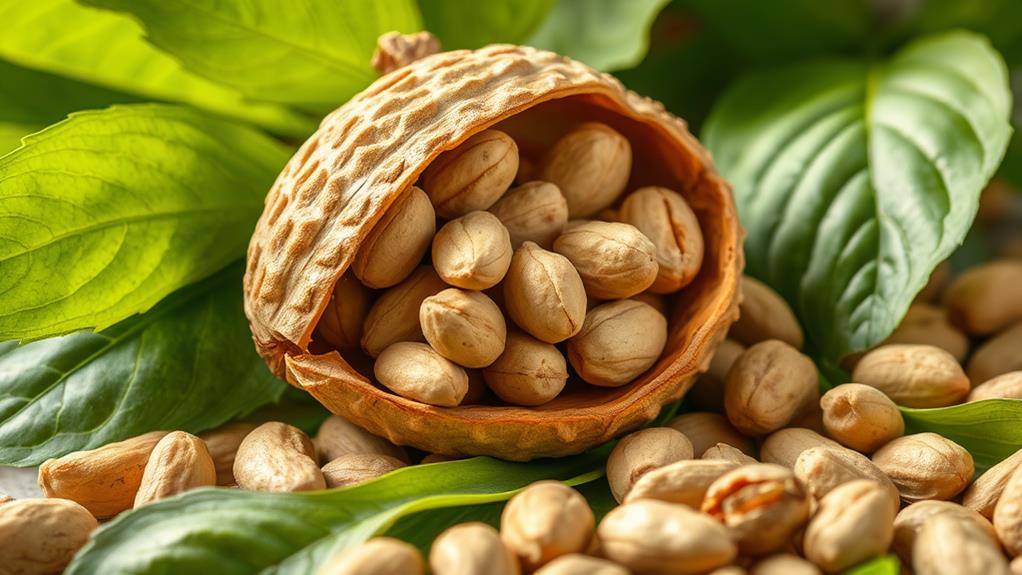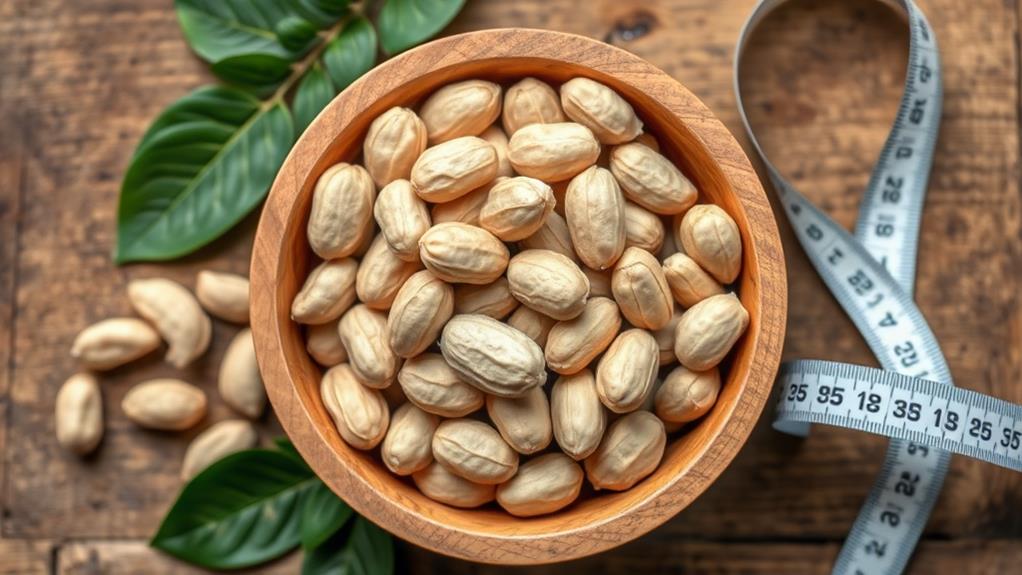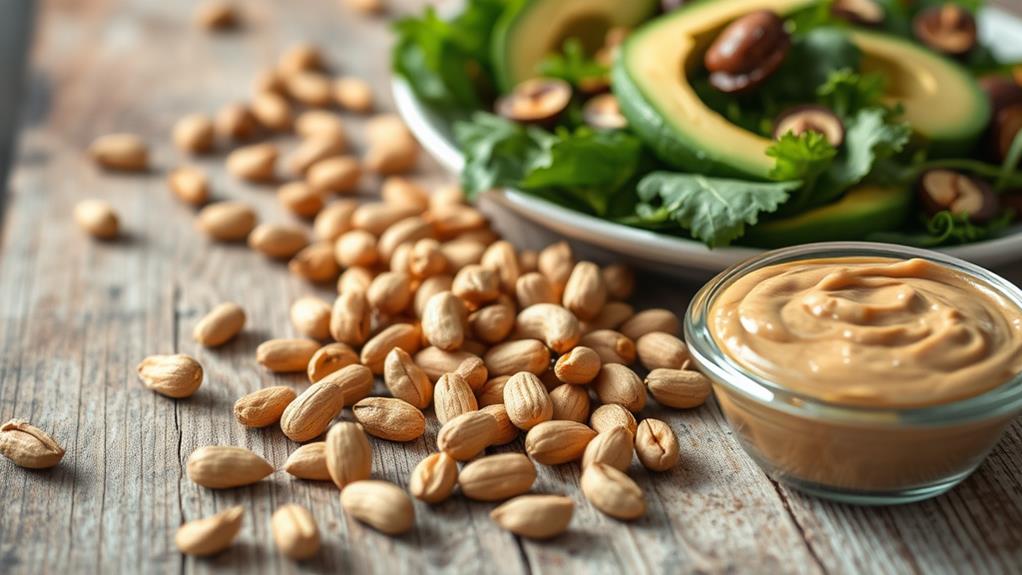If you're considering peanuts on keto, it's important to be mindful of your portion sizes. A typical serving of 30 grams contains about 5 grams of net carbs, which can quickly add up against your daily carb limit of 20-50 grams. Peanuts also provide healthy fats and protein, but moderation is key, especially since they're higher in carbs than nuts like macadamias or almonds. Be cautious with flavored peanuts, as they often include added sugars. Knowing how peanuts fit into your diet can help you make informed choices that keep you in ketosis, and there's much more to explore.
Peanuts and Keto Compatibility
Peanuts and Keto Compatibility
When it comes to peanuts and their compatibility with a keto diet, moderation is key. While peanuts aren't the typical nut, they can fit into your keto plan if you're mindful of your intake. A standard serving of peanuts (30 grams) contains about 5 grams of carbohydrates, which means practicing portion control is essential for maintaining ketosis. You'll want to keep an eye on your net carbs, as too many can derail your progress.
Additionally, peanuts offer a good source of protein and healthy fats, but they're higher in carbs compared to other keto-friendly nuts like macadamia nuts and almonds, so it's important to be aware of your choices.
Peanuts pack a nutritious punch with around 14 grams of healthy fats and 7 grams of protein per serving, making them a decent snack option. However, their moderate glycemic index can impact blood sugar levels, so it's vital to consume them carefully.
If you're looking for alternatives, consider macadamia nuts or almond butter. These options are often more keto-friendly due to their lower carbohydrate content.
Ultimately, you can enjoy peanuts, but balancing them with other low-carb snacks will help you stay on track with your keto diet. Just remember, it's all about moderation and keeping your overall carbohydrates in check.
Carbohydrate Content of Peanuts
Peanuts, while a tasty snack, contain a moderate amount of carbohydrates that can impact your keto diet. With approximately 7.63 grams of net carbs per 100 grams, they fall into a moderate carb range. A typical serving size of dry roasted peanuts is about 30 grams, providing around 8 grams of carbs. This makes it important to monitor your portion sizes to stay within your daily carb limit, which is roughly 20-50 grams for maintaining ketosis.
Additionally, consuming low-carb foods like peanuts can positively impact insulin sensitivity, promoting better glucose metabolism and overall health, as indicated by the ketogenic diet's mechanisms.
If you're looking for alternatives, boiled peanuts have a slightly lower carb content, averaging about 6 grams of carbs per serving, making them a better option for keto dieters. However, be cautious with honey roasted peanuts, as they pack in about 12 grams of carbs per serving, making them less suitable for your ketogenic lifestyle.
To enjoy peanuts without derailing your weight loss efforts, it's vital to consume them in moderation. Exceeding your daily carb limit can disrupt ketosis, making it harder to achieve your weight loss goals.
Nutritional Benefits of Peanuts

Incorporating peanuts into your keto diet not only helps satisfy your cravings but also offers a wealth of nutritional benefits. Peanuts are incredibly nutrient-dense, providing approximately 567 calories, 49.24g of healthy fats, and 25.8g of protein per 100g serving. This makes them an excellent choice for anyone following a low-carb diet, as they deliver a hearty dose of protein and healthy fats that can support your energy levels.
Furthermore, peanuts contain omega-3 fatty acids, which are essential for reducing inflammation Omega-3 fatty acids and promoting overall health. Rich in essential minerals like potassium, magnesium, and calcium, peanuts contribute to your overall health. They also contain Vitamin E, which is important for skin health and metabolism.
With around 11g of dietary fiber per cup, peanuts can aid in digestive health, ensuring you feel satisfied longer. Additionally, they provide essential amino acids, particularly leucine, which plays a key role in muscle growth and repair.
Alternatives to Peanuts on Keto
If you're looking for tasty alternatives to peanuts on your keto diet, you've got plenty of options. Almonds are a popular keto-friendly nut, containing only 6 grams of net carbs per 30-gram serving. They're lower in carbs and high in healthy fats, making them a good choice for snacking.
Additionally, almonds are rich in vitamins and minerals that support overall health, as outlined in nutritional benefits of nuts and seeds. Macadamia nuts are another excellent option, providing just 4 grams of net carbs and 23 grams of fat per 30-gram serving, perfectly aligning with your keto goals.
Pecans also fit well into a keto lifestyle, offering less than 4 grams of carbs per ounce, along with a favorable fat-to-carb ratio that promotes heart health.
If you're looking for a lower-carb seed alternative, consider flax seeds. They contain about 9 grams of total carbs per serving and are rich in omega-3 fatty acids, adding nutritional value to your diet.
For a creamy alternative, cashew butter could work, though it has slightly more carbs—about 8 grams per 30-gram serving. Just remember to consume it in moderation.
These alternatives provide a variety of textures and flavors while keeping you on track with your keto diet!
Health Considerations With Peanuts

When considering health aspects of peanuts, it's vital to recognize that they're technically legumes, which can influence how your body digests and metabolizes them compared to true nuts.
If you're on a keto diet, you should be aware that a typical serving of peanuts (30g) contains around 5g of net carbs. This can take up a significant portion of your daily carb limit if you aim for 20-50g of carbs per day. Additionally, incorporating keto-friendly sugar substitutes can help you enjoy sweet flavors without compromising your carb intake.
Peanuts have a moderate glycemic index, meaning that consuming them in excess could lead to increased blood sugar levels and disrupt ketosis. Be cautious with salted peanuts and flavored varieties, as they often contain added sugars and preservatives, raising their carb content and posing additional health risks.
Additionally, peanut allergies are common and can pose severe health risks. If you have a peanut allergy, it's important to avoid peanuts altogether, even on a keto diet.
Always read labels carefully to guarantee you're making informed choices about your peanut consumption and its impact on your health.
Conclusion
So, if you thought you could munch on peanuts like you're at a ballpark, think again! While they're a tempting snack, those pesky carbs might just rain on your keto parade. Sure, they've got some nutritional perks, but it's all about balance, right? So, if you want to keep your ketosis alive, maybe swap those peanuts for something a little less rebellious. After all, nobody wants a nutty diet disaster when you're on a keto quest!







